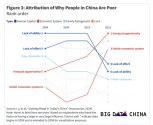PikeCowboy
Junior Member
as far as I understand, it doesn't make sense for an economy to depend on trade surplus.
suppose I'm an exporter and bring in 100usd and I exchange that for 700cny at the exim bank. I then give the exim bank 490cny to buy 70usd worth of foreign goods. You now have 30usd just sitting in the exim bank and 210cny circulating in the domestic economy not matched to any physical good. Trade surplus is inflationary to the domestic economy and deficit has to be deflationary. Did I get this wrong somewhere? I mean you could have just as well printed 210cny and handed it to someone in the domestic economy.
----------
Edit: I guess unless the exim bank is printing money it had to have purchased those 210cny from somewhere, presumably in the currency market... but if you consistently hold a surplus year after year... you might as well just print it... in an isolated system you can't really tell the difference.
Edit: that has to be what the Chinese government is effectively doing, maintaining stable exchange rates in the face of consistent surplus.
suppose I'm an exporter and bring in 100usd and I exchange that for 700cny at the exim bank. I then give the exim bank 490cny to buy 70usd worth of foreign goods. You now have 30usd just sitting in the exim bank and 210cny circulating in the domestic economy not matched to any physical good. Trade surplus is inflationary to the domestic economy and deficit has to be deflationary. Did I get this wrong somewhere? I mean you could have just as well printed 210cny and handed it to someone in the domestic economy.
----------
Edit: I guess unless the exim bank is printing money it had to have purchased those 210cny from somewhere, presumably in the currency market... but if you consistently hold a surplus year after year... you might as well just print it... in an isolated system you can't really tell the difference.
Edit: that has to be what the Chinese government is effectively doing, maintaining stable exchange rates in the face of consistent surplus.
Last edited:

